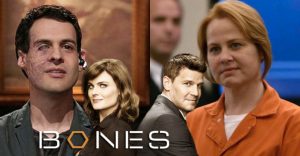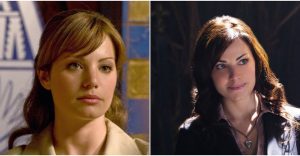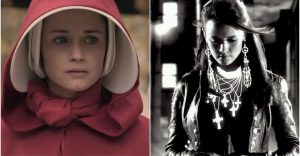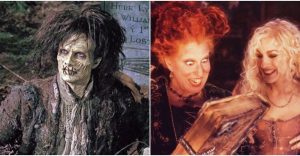Writer/Director Eytan Rockaway Interview: Lansky
Harvey Keitel stars in Lansky, based on the life and times of Meyer Lansky. For those not versed in the history of 20th century gangsters, Meyer Lansky was a notorious figure in the criminal underworld, as well as a legitimate businessman who was never busted for any significant crimes, even though the FBI spent endless decades breathing down his neck, trying and failing to arrest him for anything greater than harmless charges of “illegal gambling.”
The film stars Keitel as Lansky near the end of his life, telling his story to an author, played by Sam Worthington. The story is punctuated by extensive flashbacks to Lansky’s younger days, during which he’s played by Many Saints of Newark actor, John Magaro. The film portrays Lansky as a wise sage, burdened with the regret of a lifetime of bad decisions and trying to save his mortal soul before it’s too late.
While promoting the release of Lansky, writer/director Eytan Rockaway spoke to Screen Rant about his work on the film. He talks about how the film is partially based on his own father, who served as the model for Sam Worthington’s character, and how important it was to keep the film rooted in historical fact (while still indulging in some artistic license here and there). He explains Lansky’s complicated relationship with the nation of Israel, and chats about casting actors like Worthington and Harvey Keitel in the lead roles.
Lansky is out now in theaters and VOD.

So, why Meyer Lansky, over all the infamous gangsters over the decades?
Well, I think he’s one of the most compelling ones. Obviously, he’s one of the most famous gangsters for a reason. But he formed the national crime syndicate, which was, at one time, one of the largest crime organizations in the world. What was unique about him was that he was a criminal, but he was also a very great mathematician, and a great businessman, and he turned crime into a business, and managed it and structured it like a business. I think that’s why it was very compelling to me. And my father interviewed him before he passed away. That character, David Stone, is loosely based on my father, and I used his research and transcripts of the interview.
You had an extra level of insight that other insight that other filmmakers might not have had.
Yeah, exactly.
That kind of goes to, “Written and Directed by.” That’s a lot of responsibility, and it’s always a big deal in my book. Were you always aware of him, aside from that, obviously, what was some of the research you did?
I grew up with stories about gangsters. My father is an American History professor, but his expertise is also in American organized crime. So you grow up as a kid with these stories about gangsters, and they sound like mythical characters from Greek mythologies who lead these crazy adventures, dangerous lives, and have their own rules of conduct in the underworld, on the fringes of civilized society. I was always intrigued by the subject. But during the research I had to do, I tried staying as objective as possible. I took my father’s information and research, but I also did my own, and tried connecting the dots and putting the lines together, because at the end of the day, there’s so many different perceptions of what happened, when it happened, who was there, who wasn’t there, did he do it? And I did take creative liberties in some scenes, but not a lot. Most of what you will see is historically accurate. But I did take some creative liberties to emphasize certain elements of his life. A good scene as an example is that forest scene with the husband and the wife.
That’s a great sequence. He did some incredible things in his life, but he also hurt a lot of people, as any gangster is wont to do. Maybe I, personally, try to force things into black and white when it’s not really that simple unless you’re talking about, like, “child porn enthusiasts” or something, then it’s very easy to put that into black and white… Maybe this is an unfair question, but Lansky, good guy?
They always say that one man’s terrorist is another man’s hero. I mean, he did a lot of bad. He made a lot of bad choices. I’m definitely not glorifying him. But at the same time, he also did a lot of good. What was interesting about him, as opposed to other gangsters, was that a lot of them had a clear distinction between good and bad. He always threaded that thin grey line between the two. Whether you like him or hate him, I think each audience should come out and decide from himself. But I do think there are a lot of lessons to be learned about morality, what’s important in life… And at the end of the day, the core of the movie is about an old man coming to terms with his life. He even says that. “I can’t change my past, but I want to change the perception of it.” Obviously, he wasn’t proud about many of the things he did.

That kind of leads to… Even I’m not dumb enough to step on the landmine that is “talking about Israel.”
Yeah.
But the movie does such a great job of showing that idealism turning into cynicism, of how he helps this developing, new nation, and then, in so many words and without spoiling anything, finding out there’s not a pot of gold at the end of that tunnel for him.
Yeah. And I think that’s an occasion for any country. When you choose a certain path in life, there are consequences. If you choose a path of being a criminal and doing certain things, you’re going to close doors. And he made a lot of mistakes in his life. And I think, as he grew older, he had to deal with them. A lot of the things he expected, and a lot of the perception of him, his legacy wasn’t the legacy he wanted. Maybe for a certain type of person and in the history books, but I definitely think there were a lot of things he was ashamed of. And that was definitely one of the hard moments of his life, a reality check that he got. But when that’s the life you choose, there are consequences. I tried not sugar-coating it. It’s historically accurate. That’s what happens. The US government, he was always at odds with them for his entire life. They tried catching him, they couldn’t. But at the same time, he was a patriot and helped in the World War II efforts. That was the line he threaded, that paradox.
I’m just thinking of applying it to my life. My mom fled her country, and the reason she fled was because of American intervention in the region. And where did she go? New York!
For me, I’m an American, and I love America, I’m mostly an Israeli, but this is about the immigrant experience in America. We are all children of immigrants. He was an immigrant from Russia, where he was prosecuted because he was a Jew. And it doesn’t matter, wherever you come from, we’re all children of immigrants. And he had a tough life as an immigrant, growing up with poverty and violence. That was the life he chose, and some people choose otherwise. My grandfather came to America, also had the same life, but he was an ethical, moral human being. So, you know, each one makes his own choice. But this is a story about immigrants and American history.

Was it always going to be Harvey?
Yes. For me, it was always. There was no question. And obviously, because he is an amazing actor, but also Harvey is a New Yorker. And an ex-marine, a tough guy. So there are a lot of similarities there. And also one of the greatest actors in our generation. It was an obvious choice for me.
And 100% Ashkenazi Jew, right?
Yeah, I think 100%, yeah!
That’s kind of a role where you don’t want someone who’s not Jewish, to play that role, right?
Yeah. I think he understood the culture, he understood where he came from. Especially being Jewish, growing up as a Jew in America, I think he understood that.
Most of his scenes are with Sam. Did you do chemistry reads with the two of them together? What was the process of getting them together?
When you get actors like Sam Worthington and Harvey Keitel, you don’t get to… If you get them, you say “yes.” They’re such great actors. But they did have amazing chemistry between them. I think Sam gave him the space… When you have somebody like Harvey Keitel, you just take it in and let him do his thing, because that’s what great actors do. A director is only as good as the actors you cast at the end of the day. It’s my job to make sure that I give them the space to do what they need to do. At the end of the day, I’m capturing them for eternity. So my contract with them is that I make them look good.
Last question, very quickly… When you’re hanging out with Sam on set, are you ever, like, “Hey man, can you tell me anything about Avatar?” And he’s like, “No,” and you’re like, “Ah, I tried.”
I’m like, do that scene from Avatar! No. When you’re on set, you’re so focused because you enter into this world where you’re surrounded by production design and costumes and stuff, and you’re completely consumed. But I did ask him about experiences working on big budget movies and with other directors. And he shared that with me, happily. It was a great experience working with Sam.
Lansky is a really good movie, it’s got a beating heart at the center of that gangster shell. You nailed it, you don’t need me to tell you. Whatever you do next, I hope to catch you for that one, too!
Thank you, appreciate it!
Lansky is out now in theaters and VOD.
About The Author


















